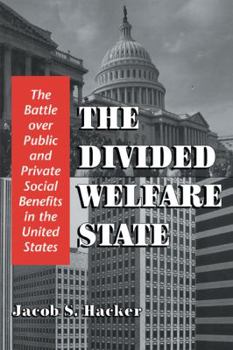The Divided Welfare State
Select Format
Select Condition 
Book Overview
The Divided Welfare State is the first comprehensive political analysis of America's distinctive system of public and private social benefits. Everyone knows that the American welfare state is unusual--less expensive and extensive, later to develop and slower to grow, than comparable programs abroad. Yet, U.S. social policy does not stand out solely for its limits. American social spending is actually as high as spending is in many European nations. What is truly distinctive is that so many social welfare duties are handled not by the state, but by the private sector with government support. With sweeping historical reach and a wealth of statistical and cross-national evidence, The Divided Welfare State demonstrates that private social benefits have not merely been shaped by public policy, but have deeply influenced the politics of public social programs--to produce a social policy framework whose political and social effects are strikingly different than often assumed. At a time of fierce new debates about social policy, this book is essential to understanding the roots of America's distinctive model and its future possibilities. Jacob S. Hacker is the Peter Strauss Family Assistant Profesor of Political Science at Yale University. Previously, he was a Junior Fellow of the Harvard Society of Fellows and Fellow at the New America Foundation as well as a Guest Scholar and Research Fellow at the Brookings Institution. He is the author of The Road to Nowhere: The Genesis of President Clinton's Plan for Health Security (Princeton, 1997), which was co-winner of the 1997 Louis Brownlow Book Award of the National Academy of Public Administration. His articles and opinion pieces have appeared in The New Republic, The Nation, the Los Angeles Times, Boston Globe, and Washington Post. A regular media commentator, he has discussed his work widely on C-Span, national public radio and in papers nationwide.
Format:Paperback
Language:English
ISBN:0521013283
ISBN13:9780521013284
Release Date:September 2002
Publisher:Cambridge University Press
Length:466 Pages
Weight:1.43 lbs.
Dimensions:1.1" x 6.0" x 9.0"
Customer Reviews
2 ratings
What an education!
Published by Thriftbooks.com User , 16 years ago
I read and summarized this book for a Japan public TV documentary during the end of the 2008 election. This book should be dumbed down and distributed to everyone who has an opinion about such things as health care insurance, welfare, and Social Security. It's validating to read that conservatives throughout the history of the social welfare system have been opposed to such things as civil rights. This is not an easy book to read and not something I would pick up on my own. But if you are interested in learning about the evolution of our social systems it's an important read. Also anyone who complains about why our elected officials don't get things done that they've promised this book gives you some ideas why. And depending on what side of the fence you're on it can also cause some righteous anger! I knocked off one star because although Dr. Hacker wrote about escalating health care costs as a contributing factor involved in health insurance he didn't mention big Pharm and their major influence. I would have liked some discussion about the big players including the FDA in potential transition problems when and if universal health care ever occurs.
Informative, Engaging, and Timely!
Published by Thriftbooks.com User , 21 years ago
At a time of renewed debate over Medicare and Social Security, this is an important and insightful look at the origins and effects of America¡¯s distinctive public-private system of social welfare. Hacker¡¯s main point is that the American ¡°welfare regime¡± (he prefers this formulation to the common term, ¡°welfare state¡±) is a lot larger than most people think because, unlike most European nations, the United States relies heavily on private social benefits provided by employers, for example, private health insurance. The book carefully explains why private benefits play such a large role in the United States, why the role of private benefits differs between the two biggest areas of U.S. social policy -- health insurance and retirement pensions -- and what difference all this makes for the politics of U.S. social policy and the nature of present political debates. The book is original and well-researched. And even if you delve into the more theoretical parts of the book, it's a joy to read -- a rare combination of academic rigor, lucid prose, and clear thinking about current affairs.






